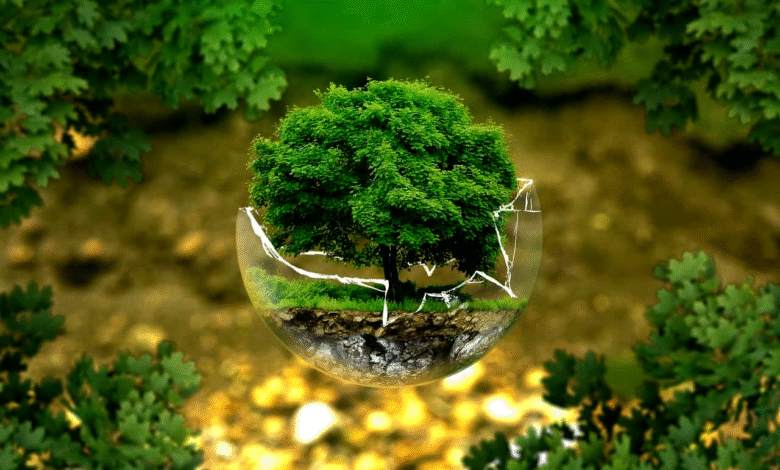Facts About Ecology Science

Ecology science, often simply referred to as ecology, is a fascinating field that delves into the intricate relationships between living organisms and their environments. In this article, we will explore key facts about ecology science, its historical evolution, applications, challenges, and future trends.
Read More: The Role of Education in Sustainability
Definition of Ecology Science

Ecology science is the study of the interactions between living organisms and their environments. It seeks to understand how organisms adapt to their surroundings and how these interactions influence the structure and function of ecosystems.
Understanding the fundamental definition of ecology science is crucial to appreciating its significance in unraveling the mysteries of the natural world.
Importance of Ecology Science
Ecology is crucial for maintaining the balance of nature. By understanding ecological processes, scientists and conservationists can make informed decisions to protect biodiversity and ensure the sustainability of ecosystems.
The importance of ecology extends beyond academic curiosity; it directly impacts our ability to safeguard the planet’s health and resilience.
Key Concepts in Ecology Science
Ecosystems and Their Components
Ecosystems comprise living organisms, their physical environments, and the intricate connections between them. Understanding the components of ecosystems is essential for comprehending ecological dynamics.
From the smallest microorganisms to the largest predators, every element within an ecosystem contributes to its overall health and functionality.
Biodiversity and Its Significance
Biodiversity, the variety of life on Earth, plays a vital role in ecosystem stability. Diverse ecosystems are more resilient and better able to adapt to changes.
The significance of biodiversity goes beyond the aesthetic appeal of various species; it directly influences the overall health and productivity of ecosystems.
Ecological Interactions
Interactions between different species, such as predation, competition, and mutualism, shape the dynamics of ecosystems. These interactions contribute to the intricate web of life.
The dance of life in ecosystems involves a myriad of interactions, each playing a unique role in sustaining the delicate balance of nature.
Historical Evolution of Ecology Science
Pioneers in Ecology
Visionary scientists like Rachel Carson and Aldo Leopold paved the way for modern ecological research. Their contributions laid the foundation for understanding the interconnectedness of nature.
The early pioneers of ecology not only observed the natural world but also advocated for the ethical treatment of the environment, leaving a lasting impact on ecological thought.
Milestones in the Development of Ecology
From the early observations of naturalists to the development of advanced technologies, ecology has undergone significant milestones that have expanded our knowledge of the natural world.
Milestones such as the development of the concept of ecological succession and the introduction of ecosystem ecology have shaped the trajectory of ecological research.
Branches of Ecology Science
Terrestrial Ecology
Examining land-based ecosystems, terrestrial ecology focuses on understanding the interactions between organisms and their environments on solid ground.
From vast forests to arid deserts, terrestrial ecology encompasses a diverse range of habitats, each presenting unique challenges and opportunities for study.
Aquatic Ecology
Aquatic ecology explores the relationships between organisms and their environments in water ecosystems, encompassing oceans, rivers, lakes, and wetlands.
The dynamic nature of aquatic environments poses specific challenges and opportunities for researchers studying the diverse life forms that inhabit these ecosystems.
Behavioral Ecology
This branch of ecology investigates the behaviors of organisms in their natural environments, shedding light on how behavior contributes to ecological dynamics.
Understanding the behavioral patterns of species provides valuable insights into their adaptations, reproductive strategies, and roles within ecosystems.
Applications of Ecology Science
Conservation Biology
Ecology plays a pivotal role in conservation biology, guiding efforts to protect endangered species and preserve threatened ecosystems.
Conservation biology utilizes ecological principles to develop strategies for mitigating threats to biodiversity and promoting the recovery of endangered species.
Environmental Impact Assessment
Industries and projects undergo environmental impact assessments to evaluate their potential effects on ecosystems, incorporating ecological science to make informed decisions.
The integration of ecology into environmental impact assessments ensures that human activities are conducted with a minimal negative impact on the environment.
Sustainable Resource Management
By applying ecological principles, sustainable resource management aims to balance human needs with the preservation of ecosystems, ensuring resources for future generations.
Sustainable resource management involves making decisions that prioritize ecological health, economic viability, and social well-being for a harmonious coexistence.
Challenges in Ecology Science
Human Impact on Ecosystems
Human activities, such as deforestation and pollution, pose significant threats to ecosystems, highlighting the need for sustainable practices.
Addressing the challenges of human impact requires a global commitment to sustainable living and responsible resource management.
Climate Change and Ecology
The impacts of climate change on ecosystems are a pressing concern, requiring innovative solutions to mitigate its effects.
Climate change alters the dynamics of ecosystems, affecting species distributions, migration patterns, and the availability of resources.
Loss of Biodiversity
The ongoing loss of biodiversity jeopardizes the stability of ecosystems, emphasizing the urgency of conservation efforts.
As species disappear, the intricate web of ecological interactions weakens, potentially leading to cascading effects throughout ecosystems.
Future Trends in Ecology Science
Technology and Ecology
Advancements in technology, such as remote sensing and DNA sequencing, are revolutionizing ecological research, providing new tools for understanding complex ecosystems.
Technology enhances the precision and scope of ecological studies, allowing researchers to explore previously inaccessible realms of the natural world.
Emerging Fields in Ecology Research
Fields like urban ecology and molecular ecology are emerging, broadening the scope of ecological studies and addressing contemporary challenges.
Emerging fields respond to the evolving needs of society and the environment, offering fresh perspectives and innovative solutions to ecological issues.
How to Pursue a Career in Ecology Science
Educational Requirements
A background in biology, environmental science, or a related field is typically required. Advanced degrees may be beneficial for research positions.
Pursuing a career in ecology science often involves a strong educational foundation, hands-on research experience, and a passion for understanding and preserving the natural world.
Job Opportunities in Ecology
Ecologists may find employment in research institutions, government agencies, non-profit organizations, and consulting firms, contributing to environmental conservation and management.
The diverse career opportunities in ecology span research, education, policy development, and on-the-ground conservation efforts, offering professionals a chance to make a meaningful impact.
Examples of Successful Ecology Projects
Ecological Restoration Initiatives
Projects aimed at restoring degraded ecosystems showcase the potential for positive ecological outcomes through human intervention.
Ecological restoration involves deliberate actions to repair and revitalize ecosystems, demonstrating the resilience of nature when given the opportunity to recover.
Conservation Success Stories
Notable examples of successful conservation efforts demonstrate the positive impact of ecological science on preserving biodiversity.
These success stories highlight the effectiveness of conservation strategies and provide inspiration for ongoing and future ecological initiatives.
Common Misconceptions about Ecology Science
Ecology vs. Environmentalism
Distinguishing between ecology and environmentalism is crucial, as ecology is a scientific discipline while environmentalism involves advocacy and policy.
While both are interconnected, understanding the distinction ensures a nuanced approach to both scientific study and environmental advocacy.
Understanding Ecological Balance
The concept of ecological balance is often misunderstood; it does not imply a static equilibrium but rather a dynamic state of flux within ecosystems.
Ecological balance involves the continuous adjustments and adaptations that occur in ecosystems, maintaining harmony amidst ever-changing conditions.
The Role of Citizen Science in Ecology
Engaging the Public in Scientific Research
Citizen science involves the public in ecological studies, fostering a sense of environmental stewardship and contributing valuable data.
Engaging citizens in scientific research creates a collaborative approach to studying the environment, leveraging the collective power of individuals for greater insights.
Benefits of Citizen Science in Ecology
The collective efforts of citizen scientists enhance data collection, expand research capabilities, and promote public awareness of ecological issues.
Citizen science empowers individuals to become active participants in scientific discovery, fostering a deeper connection between communities and the natural world.
The Connection Between Ecology Science and Everyday Life
Sustainable Living Practices
Understanding ecological principles empowers individuals to adopt sustainable living practices, reducing their environmental impact.
Simple actions, such as reducing waste, conserving energy, and supporting eco-friendly products, contribute to the broader goal of ecological sustainability.
Individual Actions for Environmental Conservation
Everyday choices, such as waste reduction and eco-friendly habits, contribute to the broader goal of environmental conservation.
Individual actions collectively shape the health of the planet, emphasizing the importance of personal responsibility in preserving ecological integrity.
Exploring the Fascinating World of Microecology
Microbial Communities in Ecosystems
Microecology focuses on the role of microorganisms in ecosystems, revealing their crucial contributions to ecological processes.
Microbes, though often unseen, play vital roles in nutrient cycling, decomposition, and maintaining Microecology and Human Health
Studying microecology provides insights into the connections between microbial communities and human health, opening new avenues for medical research.
Understanding the intricate relationships between microbes and human health has implications for medicine, agriculture, and the overall well-being of ecosystems.
Challenges and Solutions in Ecological Research

Funding and Support for Ecological Studies
Securing funding for ecological research is a constant challenge, requiring collaboration between scientists, policymakers, and the public.
Addressing the financial constraints of ecological research is essential for advancing our understanding of the environment and implementing effective conservation strategies.
Collaborative Efforts in Ecological Research
Addressing complex ecological issues necessitates collaborative efforts, bringing together experts from diverse disciplines to find holistic solutions.
Interdisciplinary collaboration allows researchers to tackle multifaceted challenges, fostering innovation and resilience in the face of ecological complexities.
Conclusion
Ecology science is a dynamic and vital field that explores the intricate relationships between living organisms and their environments. From historical milestones to emerging trends, ecology continues to shape our understanding of the natural world. As we face challenges like climate change and biodiversity loss, the role of ecology in guiding conservation efforts becomes increasingly crucial.
Read More: The Science of Happiness: The Key to a Fulfilling Life
FAQs
- Is ecology the same as environmental science? No, while both fields overlap, ecology specifically focuses on the interactions between organisms and their environments, whereas environmental science is a broader discipline that includes policy and management.
- How can I contribute to ecological conservation? Individuals can contribute by adopting sustainable practices, supporting conservation initiatives, and participating in citizen science projects.
- What is the significance of biodiversity in ecosystems? Biodiversity enhances ecosystem resilience, promoting stability and adaptability to changing conditions.
- Are there specific challenges in urban ecology? Urban ecology faces challenges such as habitat fragmentation and the impact of urbanization on wildlife, requiring innovative solutions for sustainable city development.
- Can citizen science make a real impact in ecological research? Absolutely. Citizen science contributes valuable data, broadens the scope of research, and fosters public engagement in ecological issues.








One Comment